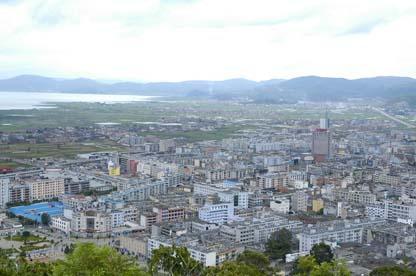
1) Cultural landscape
Xiushan Township occupies an area of 46 square kilometers and takes charge of 4 districts and 8 village committees with a total population of 100,000. It is the biggest township in Tonghai with sound development of agriculture, industry and business. The township is one of the towns that have the earliest human settlers and the most suitable environment for living in the province, with long history, rich culture and numerous relics. Political administration started here in as early as Tan Dynasty when Tonghai Township was set here and in Yuan Dynasty the area became the center of politics, military, economy and culture in South Yunnan. Ancient ruins, architectures, trees of rare species, relics, and historic sites endow Xiushan with long history and rich cultural deposition. In Ming and Qing dynasties, the township nurtured civilian and military Jinshi 37 people and Jugong 600 people. Famous personalities include the founder of Dali Kingdom Duan Siping, General Zhu Zun who proposed the prohibition of opium before Lin Zexu, the well-known calligraphy artist Kan Zhenzhao of Qing Dynasty, the eminent writer Yang Shen an of Ming Dynasty, the follower of Mr. Sun Yisen Fan Shishen in the Republic of China, the great translator Na Xun who translated the Arabian Nights, and the famous expert of Arabian history Na Zhong. The 300 well-preserved steles and couplets in Xiushan Mountain are the best proof of the long history of the area. There are 200 well-preserved ancient Yi Ke Yin style architectures in the old town, of which 11 houses were built in Ming Dynasty and 48 in Qing Dynasty. The structures of Yu City in Ming Dynasty centered around Jukui Pavillion and the old town before Ming Dynasty under the foot of Xiushan Mountain and near Confucius Temple are still preserved, which adds uniqueness to the landscape Xiushan Township. The town has a mountain at the back and a lake in front and the scenery here is beautiful. It has long been known as a town in Yunnan with kind and unsophisticated dwellers, rich cultural deposition, and active trading.
2) Recreation and Travel in the Countryside
Qilu Lake, one of the nine Yunnan high-plateau lakes, is located in Northeast of Tonghai basin and linked with north of the downtown area. The lake belongs to Panjiang River system and is a tectonic lake formed by fault subsiding. The average water level is 1,731.5 meters above sea level. The length of the lake from east to west is about 15.5 kilometers and from north to south, about 3.1 kilometers, with a total occupation of 42.3 square kilometers, average depth 4 meters, deepest spot 15 meters, optimum water reserve 149 million cubic meters, and transparency 0.3 to 1.2 meters. The shallow freshwater lake is in a form of new moon with the east and west closed up. The catchment area reaches 363 square kilometers. Along the lake, a 10-kilometer-long dam has been developed into an area with restaurants, fishing service, flower appreciation and water fun facilities.
At present, within the south border of Qilu lake there are more than 10,000 mu of lotus and boat services are provided for recreational activities. Along the dam, willows and peach trees have been planted and grape gardens have been built. The roads along the lake have been built into cement ones. Restaurants that are clean and environment-friendly have been opened along the roads. Restaurants are integrated into the scenes of trees, farmland and the lake, which brings visitors a refreshing feeling. There is a 600 mu artificial wetland at Huanglong which is planned to develop into an ecological sightseeing zone with integration of recreation and environmental protection. Growing of ornamental plants that are economical and organic, construction of towers and pavilions, and sightseeing boat service are planned to provide water purification, sightseeing and economic benefit gaining.
Source: The People's Government of Tonghai County
Translated by Rao Zhaoping





